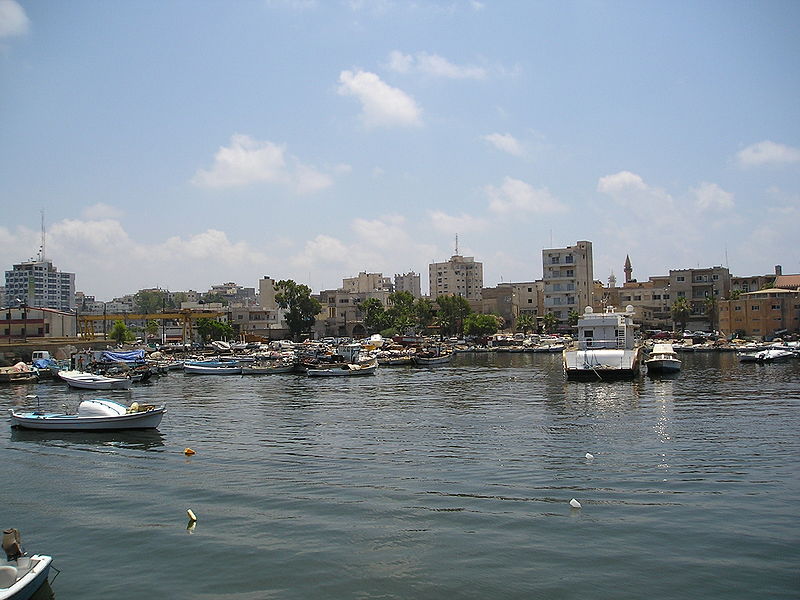It was often attacked by Egypt, besieged by Shalmaneser V, who was assisted by the Phoenicians of the mainland, for five years, and by Nebuchadnezzar (586–573 BC). Ezekiel 26:12–14 states that God caused Nebuchadnezzar to destroy Tyre because its residents gloated over the fall of Jerusalem. The Tyrians held off Nebuchadnezzar's siege for thirteen years, resupplying the walled island city through its two harbours. Later, a king of Cyprus took Tyre using his fleet in the 370s BC, "a remarkable success about which little is known," according to historian Robin Lane Fox.
In 332 BC, the city was conquered by Alexander the Great, after a siege of seven months in which he built the causeway from the mainland to within a hundred meters of the island, where the sea floor sloped abruptly downwards. Tyre continued to maintain much of its commercial importance until the Christian era. The presence of the causeway affected water currents nearby, causing sediment to build up, making the connection permanent.
Alexander used the remains of the old city to build the causeway from the mainland to the island where the new Tyre was located.
In 315 BC, Alexander's former general Antigonus began his own siege of Tyre, taking the city a year later.
Ezekiel 26:3-5, “Therefore thus saith the Lord GOD; Behold, I am against thee, O Tyrus, and will cause many nations to come up against thee, as the sea causeth his waves to come up. And they shall destroy the walls of Tyrus, and break down her towers: I will also scrape her dust from her, and make her like the top of a rock. It shall be a place for the spreading of nets in the midst of the sea: for I have spoken it, saith the Lord GOD: and it shall become a spoil to the nations.”

Photo to right: A modern fishing harbor in Tyre.
Tyre (Lebanon) is a source of fulfilled prophecy in the Bible. There is a preponderance of historical evidence which proves the accuracy of the Bible concerning numerous prophecies. If you want solid evidence that the Bible is truly God's inspired Words, then all you need to do is open your heart and mind. Wisdom uttereth her voice in the streets as we read in Proverbs 1:20.
The city of Tyre (Tyrus) was a thriving Phoenician city in ancient times, a source of economic abundance and trading. God pronounced judgment upon the city of Tyre. The surviving inhabitants after Babylon's invasion moved all their possessions and families to a little isle just off of Tyre. They thought they'd be safe on their little island.
But 250 years after Babylon destroyed Tyre, Alexander the Great of Greece was determined to conquer that little island. So what Alexander the Great did was scrape the dust of Tyrus (just as God prophesied in Ezekiel 26:3-5), using the dust to build a causeway (a road that is raised above water or marshland or sand) reaching out to that little island where the remnant of Tyrus thought they were safe. Alexander the Great totally annihilated that little island and left it desolate just as God had foretold in prophecy. Right down to the last letter, God's Word has been fulfilled.
History documents that Tyre was destroyed by her enemies, leaving the city a wasteland...
Today, fisherman cast their nets around Tyrus, just as God prophesied. That ought to be exciting to you my friend. I mean, if you get on a plane and fly to Tyrus today, you see fishermen casting their nets in Tyrus. It's a desolate area. The little island is desolate. God left Tyre desolate, just as the Bible says in Ezekiel 26:3-5).
Ezekiel's Tyre Prophecy DefendedNebuchadnezzar's Babylon was the first of the nations to come against Tyre. Alexander's forces were put together from a coalition of Greek city-states. Each of these was an independent entity and acted as a nation unto itself. Alexander's father, Philip II, unified (by military force) these city-states and the regions of Thrace, Macedonia, and Greece proper under his rule - giving Alexander the unified front he needed to go forth and conquer.
Nevertheless, this was a coalition composed of many nations - and thus fulfills the prophecy.
A Skeptic once objected to this: "They were COALESCED into ONE NATION" - so the prophecy is NOT fulfilled there. A reader however has noted:
In fact Phillip II conquered the Greeks. He was seen by many of them as being a barbaric overlord from the North. On the death of Alexander they went back to being city states, though with a ruler of Macedonian extraction over them for the most part. In addition Alexander's Macedonian army had Cretan mercenary archers, Agrianian mercenary light infantry, led by their king at the outset, but he died before Tyre, Thracian mercenaries and Thesallian cavalry. These are in addition to the fleets of countries that did not like Tyre because of their dominance of the Mediterranean trading.
Moreover, according to the ancient historian Arrian, author of "Anabasi Alexandri," (2.20.1-2), Alexander got some help in attacking Tyre. Having no navy of his own to speak of, he got naval help from his friends in Macedon and from the Phoenician city-states Aradus, Byblos, and Sidon; ships also came from Enylos, Soli and Mallos, Rhodes, Lycia, and Cyprus to join in the fray and help Alexander overcome Tyre [Flem. Tyre, 58]. Each, other than Macedon, was an entirely separate nation from those in Alexander's land forces: a sort of ancient Gulf War Coalition.
SOURCE:
